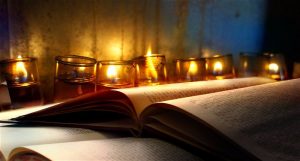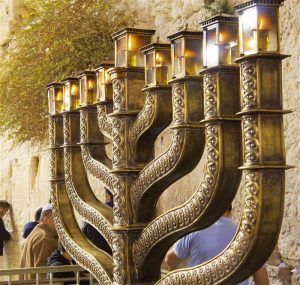Chanukah, which is not mentioned in the Torah among the feasts that Israel is commanded to celebrate, is often said to be a non-biblical holiday. Therefore, the logic goes, these eight days could be considered merely joyous days for children, another vacation from school. Indeed, the memorable Chanukah-related events took place many years after the completion of Pentateuch. However, had these days truly been unimportant in the history of the Jewish people, the years would have blotted out their memory.
The situation of the second centur y B.C. Jews living under the rule of Antiochus Epiphanes can be fully appreciated only by those who have experienced real persecution for the Word of God. The Syrian king Antiochus in essence forbade the Jews to be Jews and to confess faith in the God of Abraham, Isaac, and Jacob. The sacrifices were stopped; Shabbat and Kashrut observance, circumcision, and even the reading and study of the Torah were outlawed. This ungodliness reached its culmination in the desecration of the temple.
y B.C. Jews living under the rule of Antiochus Epiphanes can be fully appreciated only by those who have experienced real persecution for the Word of God. The Syrian king Antiochus in essence forbade the Jews to be Jews and to confess faith in the God of Abraham, Isaac, and Jacob. The sacrifices were stopped; Shabbat and Kashrut observance, circumcision, and even the reading and study of the Torah were outlawed. This ungodliness reached its culmination in the desecration of the temple.
This picture is all too familiar for those who were born and lived in the USSR, for example. A few days ago, a Facebook friend of mine posted an archival document from 1937—Stalin’s era. It says that a certain priest, Orlov, was sentenced to death by shooting for encouraging children to attend church, which was seen as anti-Soviet propaganda. Faith and the Bible were outlawed, and any attempts to confess the faith, or to read and study the Holy Scriptures, were severely suppressed by the state, which proclaimed itself atheistic. We can’t interview the Jews of the 2nd century B.C. in order to learn how they kept the faith, overcame the prohibitions, and strived for holiness. But some who can tell us about suffering for their faith in the 20th century are still alive. Perhaps hearing their stories will help us better understand the meaning of Chanukah.
It is interesting that according to tradition, the days of Chanukah are considered not festive, but ordinary—yet two  Torah scrolls are brought out for morning prayers in the synagogue on these days. During the whole year there isn’t a single other day when two scrolls are brought out—not even on the half-festive days of Succoth. So why are two scrolls used during Chanukah? The reason is that while an ungodly ruler wanted to uproot Torah, which is the light of life, the Jews of that time were willing to give up their lives for Torah and the commandments, and the Almighty showed them special favor. “Salvation came suddenly, as light from a lit fire,” writes Josephus. And on the Sabbath during Chanukah, three scrolls are brought out, emphasizing that the Almighty’s love for Israel that was manifested at Chanukah was connected to Torah.
Torah scrolls are brought out for morning prayers in the synagogue on these days. During the whole year there isn’t a single other day when two scrolls are brought out—not even on the half-festive days of Succoth. So why are two scrolls used during Chanukah? The reason is that while an ungodly ruler wanted to uproot Torah, which is the light of life, the Jews of that time were willing to give up their lives for Torah and the commandments, and the Almighty showed them special favor. “Salvation came suddenly, as light from a lit fire,” writes Josephus. And on the Sabbath during Chanukah, three scrolls are brought out, emphasizing that the Almighty’s love for Israel that was manifested at Chanukah was connected to Torah.
A rediscovery of God’s Word, which is able to illuminate every person’s life, is a feast. And returning to a life of obedience to his Word is a great feast. Unfortunately, “Hellenization” can creep into our lives undetected—and it will lead to destruction. Therefore, the cleansing and rededication of our inner temple is a necessary constant process, and it is God’s Word that can shine its light into the darkest corners of our being.
At Chanukah, Yeshua walked about in the temple and talked with people. When asked to state plainly whether he was the Messiah, he said that his deeds spoke for themselves. I pray that our deeds will not merely speak, but boldly proclaim faith in Yeshua, who is Torah incarnate.
“I have come into the world as a light, so that no one who believes in me should stay in darkness” (John 12:46).
Rita Kontorovich